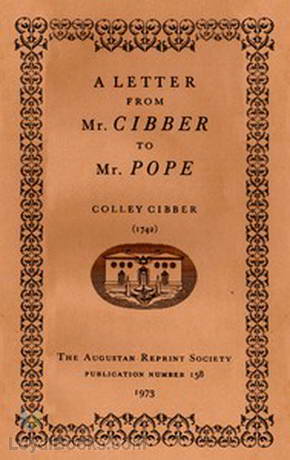|
Books Should Be Free Loyal Books Free Public Domain Audiobooks & eBook Downloads |
|
|
Books Should Be Free Loyal Books Free Public Domain Audiobooks & eBook Downloads |
|
A Letter from Mr. Cibber to Mr. Pope By: Colley Cibber |
|---|

A Letter from Mr. Cibber to Mr. Pope by Colley Cibber is a fascinating and thought-provoking piece of literature that delves into the complex relationship between two influential figures in the world of 18th-century British theater. Colley Cibber, a renowned actor and playwright, writes a candid letter to his contemporary, Alexander Pope, addressing the ongoing feud between them.
From the very first pages, Cibber's writing captivates readers with its engaging and conversational tone. The letter format adds a personal touch, making it feel as if we are privy to a private conversation between two significant figures of their time. Cibber's style is refreshingly straightforward, making the letter easily accessible to both scholars and general readers alike.
The content of the letter mainly revolves around the antagonism between Cibber and Pope, which had its roots in the dramatic world but extended far beyond it. Throughout the letter, Cibber shares his side of the story while subtly throwing shade at Pope. He portrays himself as the misunderstood victim of Pope's merciless satirical attacks, expressing his frustration with the poet's harsh and relentless criticism.
Cibber's letter serves as more than just a defense of his reputation; it also provides valuable insights into the inner workings of the theater industry during the 18th century. Cibber discusses the influential figures and power dynamics of the time, shedding light on the challenges faced by actors and playwrights like himself. His account paints a vivid picture of the era, capturing the political and social intricacies that shaped the literary scene.
One of the most fascinating aspects of A Letter from Mr. Cibber to Mr. Pope is the exploration of larger themes such as fame, jealousy, and the nature of art itself. Cibber's acute observations and introspection shed light on the human condition and the complexities of a rivalry rooted in envy and intellectual differences. The candid way in which he reflects upon his own flaws and motivations adds a layer of honesty to his narrative, provoking readers to ponder the intricate relationship between personal ego and artistic expression.
Despite Cibber's attempt to rebuff Pope's criticism, his letter also presents an opportunity for self-reflection and introspection. It challenges readers to question the validity of their own judgments and the weight they place on external opinions. Furthermore, the letter's publication as a response to Pope's The Dunciad adds to the ongoing debate regarding the role of critics in the artistic community, questioning the boundaries between constructive critique and personal attacks.
Although A Letter from Mr. Cibber to Mr. Pope is undoubtedly an engrossing read, it is not without its limitations. Cibber's perspective dominates the narrative, leaving Pope's side largely unexplored. This one-sided approach may skew the reader's perception, making it essential to seek a balanced understanding by considering other available sources of information.
In conclusion, A Letter from Mr. Cibber to Mr. Pope is an engaging and enlightening piece of literature that invites readers into the tumultuous world of 18th-century British theater. Colley Cibber's candid and introspective writing style captivates from start to finish, offering valuable insights into a famous feud and the larger themes it encompasses. Whether one's interest lies in the history of theater, the intricacies of literary rivalries, or the exploration of human ego, this book is sure to leave a lasting impression. He that delights to Plant and Set, Makes After Ages in his Debt. Where could they find another formed so fit, To poise, with solid sense, a sprightly wit? Were these both wanting, as they both abound, Where could so firm integrity be found? The verse and emblem are from George Wither, A Collection of Emblems, Ancient and Modern (London, 1635), illustration xxxv, page 35. The lines of poetry (123 126) are from "To My Honoured Kinsman John Driden," in John Dryden, The Works of John Dryden , ed. Sir Walter Scott, rev. and corr. George Saintsbury (Edinburgh: William Patterson, 1885), xi, 78. THE AUGUSTAN REPRINT SOCIETY COLLEY CIBBER A LETTER FROM Mr. CIBBER TO Mr. POPE (1742) Introduction by HELENE KOON PUBLICATION NUMBER 158 WILLIAM ANDREWS CLARK MEMORIAL LIBRARY UNIVERSITY OF CALIFORNIA, LOS ANGELES 1973 GENERAL EDITORS William E. Conway, William Andrews Clark Memorial Library George Robert Guffey, University of California, Los Angeles Maximillian E. Novak, University of California, Los Angeles David S. Rodes, University of California, Los Angeles ADVISORY EDITORS Richard C. Boys, University of Michigan James L... Continue reading book >>
|
| eBook Downloads | |
|---|---|
|
ePUB eBook • iBooks for iPhone and iPad • Nook • Sony Reader |
Kindle eBook • Mobi file format for Kindle |
|
Read eBook • Load eBook in browser |
Text File eBook • Computers • Windows • Mac |
| Review this book |
|---|